
Posts Tagged ‘peace’
Tension in the Middle East
Despite beginning a critical phase (winter),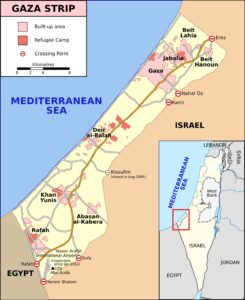 the war between Ukraine and Russia is out of focus, with increasing tension between Israel and Palestine, which claims its own territory.
the war between Ukraine and Russia is out of focus, with increasing tension between Israel and Palestine, which claims its own territory.
After a daring and cruel incursion into Israeli territory, the military group took several hostages and Israel responded by attacking areas of the Gaza strip and cutting off water and energy in Israeli territory as a way of pressuring the handover of the hostages.
The humanitarian situation caused several international organizations to appeal to Israel to allow humanitarian aid, while Israel gives the option of moving to the south where the water and energy supply would be restored, giving a very short deadline and an ultimatum.
There is a point to the south where a passage to Egypt is possible, which is the Rafah refugee camp, negotiations between US Secretary of State Antony Blinken and Egyptian President Abdel-Fattah El-Sisi indicate that this passage would be open for humanitarian aid.
Israel is preparing for a fight on three fronts, as in southern Lebanon there were attacks by another anti-Semitic group, Hezbollah and there are already tensions and the capture of combat points with Syria, also through Hezbollah.
The greatest tension is the possible involvement of Iran, which finances these groups against Israel and Hamas leaders have already gone to Iran to talk to the country’s authorities, however the US warns that Iran’s entry into the war would cause strong tension with the West, since the US sent aircraft carriers.
The involvement of the Arab world could make the crisis even greater, as there are already unilateral talks.
Russia is a traditional ally of Syria, and with a military approach to Iran it could create an axis of allies with common enemies, which paints a dangerous geopolitical picture.
Peace seems distant, and the elements for a war with tragic consequences are emerging, but there are still localized forces for peace.
New war front and dangerous week
Since Israel had developed a strong anti-aircraft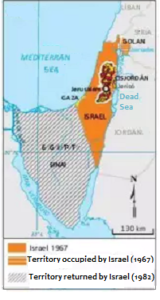 battery scheme called the Iron Dome, missile attacks in the region had decreased, but at the end of the week a new attack by the Hamas group took place and more than 700 people were killed, showing that there are weaknesses in this system.
battery scheme called the Iron Dome, missile attacks in the region had decreased, but at the end of the week a new attack by the Hamas group took place and more than 700 people were killed, showing that there are weaknesses in this system.
Israel’s military was caught by surprise on Saturday (10/07) and despite decades of the country becoming a technological powerhouse with the world’s most impressive military and a world-class intelligence agency, all of this simply hasn’t worked and This creates a new front of war in geopolitics already with delicate problems and Israel responded with missiles into Palestinian territory.
Hamas has Iran as a strong ally, which has supplied drones to Russia, and although it has denied that this continues to happen, Iran wants to be part of the BRICS and on the side of another invisible war, according to the words of Medvedev, the vice-president of the Russia’s Security Council and former president of the country, this war is taking place.
He was referring to Russia’s good harvest of wheat grains, which it intends to become a bargaining chip with allied countries, even providing supplies to allied countries in Africa that do not have the resources to purchase grains.
The week is delicate in Ukraine and Russia, because on both sides a new surprise attack is expected, such as that of Hamas in Israel, on the Ukrainian side long-range missiles, and on the Russian side the destruction of energy sources in Ukraine which would make the coming winter cruel to the population and weaken the Ukrainian military army, which already has difficulties with ammunition for conflict regions.
Something new is expected in terms of peace, there is no shortage of nods from Russia, but without negotiating the territories already conquered, while the Ukrainian side wants possession back, including the controversial Crimea, one of the main targets in the counteroffensive.
All people of good will and who know the dangers of war want some relief.
True commitment to the common good
Bad managers and dictators also promise to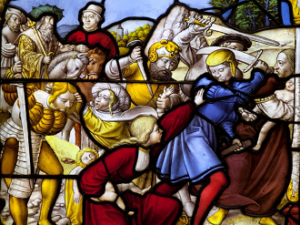 work for the excluded and the common good, what happens is that their true personal interests remain hidden.
work for the excluded and the common good, what happens is that their true personal interests remain hidden.
No one openly says they are going to do evil, except declared psychopaths who are already at a level of mental illness that can no longer disguise their desires.
Political and social analyzes hide interests of violence, hatred and war against opponents, there is no shortage of justifications, but any initiative of exclusion is already an indication that no common good will be well managed by these managers.
They begin with small actions that initially confuse people with good faith and who actually want the common good for all, a peaceful and balanced life for everyone, but little by little the true personal desires for personal possession of goods are revealed.
Corruption also starts like this, small unrestrained thefts lead to large ones when there is no impunity, parents who correct and educate without children know this, it is necessary to always be attentive to actions and what each small gesture leads to, educators also know this.
As a biblical reading says, an owner of a vineyard rented it and traveled, after a certain time he ordered the employees to collect the rent (Mt 21:33) they beat him and sent him back, he sent others and they also caught him and returned with nothing and finally sent his son, so the tenants thought let’s kill him and keep the vineyard, and Jesus remembers himself at the end of the parable: the stone that the masons rejected became the cornerstone.
This is how good is established, with those that the evil people rejected, oppressed and after much suffering it is possible to establish peace and the common good.
Resilience and the development of good is greater than great evil, although avoiding them also means avoiding injustice, social imbalances and mainly innocent deaths.
Because evil grows
Common sense is to say that evil grows because good is omitted, in part this is true, as evil is the absence of good, but this absence can be due to aporia (lack of knowledge), due to bad education that forms unenlightened minds and due to end out of pure pride and power.
good is omitted, in part this is true, as evil is the absence of good, but this absence can be due to aporia (lack of knowledge), due to bad education that forms unenlightened minds and due to end out of pure pride and power.
Power is a way of legitimizing both good and evil, this is only possible through violence, and generalized violence is war, so this is the clearest and most unequivocal form of evil, in it intolerance, contempt for what is different, the imposition of ideas and injustices is facilitated.
Thus, at different times in our history, it was through violence that empires and dictators imposed their wills and ideologies, not without the consent of a large part of the population, which is why we remember bad education, whether through propaganda campaigns or through schooling itself. impoverished and malformed, the two issues are linked.
Therefore, it is necessary to pay attention to management at all levels, from our homes, neighborhoods and condominiums to power structures, small illegitimate actions, education for empathy, coexistence, cleaning and even leisure must be observed and guided by managers and public bodies in order to preserve common space and public goods.
The zeal for honesty, transparency, respectful dialogue between opinions that are not necessarily opposite, but different even if in completely divergent directions should not be a reason for hatred and violence, dialogue is always possible.
Evil needs polarization, radicalization (in the bad sense, there is the good sense of going to the root of a problem), pure disagreement as a way to justify and propagate violence.
Just like the seeds of a good tree, weeds and poisonous plants also have roots, they grew in a healthy plantation and the fact that they must grow together can be a mistake because they can suffocate the good seeds, pests and diseases in plants.
Care must also be taken to cure these pests, in agriculture several pesticides have already been condemned, and even disease-resistant plants can be questioned, genetic mutation can cause greater harm than expected, there is a lot of ethical dialogue about this.
Therefore, three precautions must be considered: the ethical education of valuing what is good, the zeal so that error and evil do not spread and finally the correction methods must be careful not to cause even greater harm.
Religions and evil
One of the biggest mistakes, already developed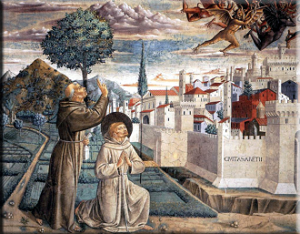 in some of the posts, is the Manichaean duality of evil x good, without understanding that evil is precisely the absence of good, great Christian thinker, Augustine of Hippo converted precisely by abandoning Manichaeism.
in some of the posts, is the Manichaean duality of evil x good, without understanding that evil is precisely the absence of good, great Christian thinker, Augustine of Hippo converted precisely by abandoning Manichaeism.
Religious concepts that have long been forgotten, or that are submerged in mistaken preaching, impede what would be the “natural flow of humanity towards the enlightenment of the soul”, evil has deep-rooted sources in the form of old thoughts and emotional burdens from the past and, despite obsolete, still persist, hindering the progress of souls.
The remedy would be very simple, the closer the soul is to enlightenment, the less evil is present, and the more enlightened souls make the world more empathetic, harmonious and free from injustice.
The ethics and morals that derive from the need for civilizing progress do not find space if there are not souls and people in prominent positions with clear and convincing illumination, that is why evil has become a social, theological or ideological issue, and the both times.
It’s not just Christian thinkers who say this, Hannah Arendt talks about the Banality of Evil, Nietzsche about the “death of God” (or how we “kill” Him, of course impossible), Paul Ricoeur and Lévinas about the Other and Byung Chul Han about the “ Society of Fatigue” speaks of the vita contemplativa as a complement to the vita activa (which Hanna Arendt also spoke of), even remembering Christian thinkers.
The return of threats of war, the social crisis of moral values (everything is permitted!), before a true civilizational crisis occurs, a new enlightenment of souls is necessary (in Picture st. Francis expelling devils from Arezzo, by Benozzo Gozzoli).
The lack of understanding of subjectivity and human imagination, or its submission to unenlightened values, the absence of compassion towards others, the misunderstanding of progress as having fundamental positive aspects, even to save the civilizing process, leads society to exhaustion , disbelief or the fatality of wars and hatred.
It is not difficult to find positions in newspapers and social media in favor of the process of excluding people with a certain opinion, religion or even simple disagreement with dubious moral values (see the case of abortion in Brazil at the moment), the debates are sterile and instead of arguments the reactions are sarcasm and irony.
They are seeds of the broader process of civilizational crisis in progress and detected by great thinkers since the last century, crediting them to new media, to the resurgence of nationalism and authoritarian currents is to look only at the consequence, the root is the absence of enlightened souls who help humanity to contemplate its future with greater grandeur.
*When Francisco was in Arezzo, there was a great scandal and a war almost throughout the city, day and night, because of two factions that had long hated each other.
War attrition and peace in Nagorno-Karabakh
As the Russian/Ukrainian war enters a phase of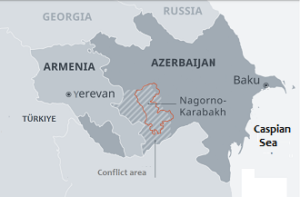 attrition, a border region has a sign of peace, even if it means a loss of territory.
attrition, a border region has a sign of peace, even if it means a loss of territory.
The struggle for dominance over the Armenian-majority region of Nagorno-Karabakh goes back centuries, however the president of the self-declared republic of Nagorno-Karabakh, Samvel Shaharamanyan declared that it would cease to exist from the 1st. January 2023.
In the 18th century, when the region was under pressure from Persia, Russian Tsarina Catherine II issued letters of protection to them, but the conflict was never fully resolved.
The signed decree dissolved all state institutions that will be vacated by the beginning of 2024, and more than 100,000 Armenians have already left the country, which already has the presence of military personnel from Azerbaijan, with a Muslim majority and supported by Turkey, Armenia is Christian and supported by Russia.
The region has geopolitical importance because since Russia’s war against Ukraine, Azerbaijan has supplied millions of barrels of oil to the European Union through the Caspian Sea along the Mediterranean coast, and recently Russia announced that it will no longer supply it.
The Armenian genocide of 1915-1916 during the Otman Empire led many Armenians to flee to this region of Nagorno-Karabakh, since then they have been called Azeris, during the Russian revolution the region continued in conflict with Azerbaijan, although both were Soviet republics, the anti-Armenians in the city of Shusha killed 30 thousand Armenians.
With the end of the Soviet Union, the Armenians once again established themselves as a nation, but the Nagorno-Karabakh conflict remained, there were several periods of fighting in the region, now with the session of the territory this autonomous republic ceases to exist.
Despite the fears of separatist Armenians, this new situation is a great sign of peace.
Russia and Ukraine can be inspired by this model or something similar, the world wants peace.
The good and wars of Darius
The separation between secular and religious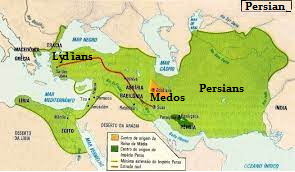 human historie´s is not always possible without an adulteration of both by those who do it in a particular way.
human historie´s is not always possible without an adulteration of both by those who do it in a particular way.
This process also includes the question of good and evil, it is common thought that those who are in this or that religious confession will be “saved”, or even, who have somehow accepted God in their lives, this is just a part of the truth .
The biblical reading says: “not everyone who says ‘Lord Lord!!’ will enter the kingdom of heaven” (Mt 7:21) and so the understanding of what it actually means to do good pleasing to the heavens is not even remotely the simple formal or nominal religious commitment requires the will.
The will is also not like a belief that spreads today, the daily reaffirmation of the desire for a certain thing, called the law of attraction or “the mystery”, nor is it also the will to power as Nietzsche thought, for the philosopher everything in the world it is Will to Power because all forces seek their own expansion.
Will is, in a spiritual sense, that which is in line with the power that we are and that we must develop, one would say a vocation, but in everyday acts that require the ability to discern between one’s own will, often impetuous, and that which is a good thing.
We can better distinguish between evil, the absence of good, and good, which we developed last week as the inadequacy of good: illicit enrichment, being superior to others, judging by our own non-universal criteria, in short, an infinite number of issues can be an evil. not apparent.
A universal story cited in the Bible is that of Darius in the Persian Empire, not being religious, he appointed the prophet Daniel to one of his provinces (called satrapies), determined that the Hebrew people be repatriated and authorized the reconstruction of the temple, as per narrates the book of Ezra.
Without being religious, he recognizes the Hebrew people, so Darius has a privileged place in biblical and religious history. Another curious event is the war of the Medes and Lydians, after an indecisive battle, on May 25, 585 BC, both armies end the fight by a sign in the sky, which was actually a lunar eclipse (a similar one will occur on October 14).
This date was confirmed by scientific calculations, being one of the first recorded annular eclipses.
Thus, one can understand historical and divine designs even without belief, as King Darius did, and do what is fair and good for people and humanity.
In times of threat of war, finding this asset can prevent major disasters.
A cold and dangerous European winter
We are entering spring in the southern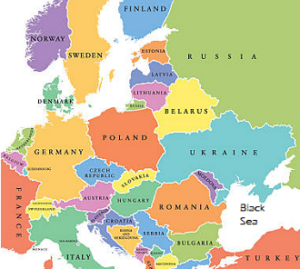 hemisphere and autumn in the northern hemisphere, in Europe the concern about fuel stocks for the winter due to the Russian embargo is growing, there is a danger of rationing and a rush to use coal, in Poland for example there is already queues to buy stocks.
hemisphere and autumn in the northern hemisphere, in Europe the concern about fuel stocks for the winter due to the Russian embargo is growing, there is a danger of rationing and a rush to use coal, in Poland for example there is already queues to buy stocks.
But this is not the only aspect, the reduction in the supply of diesel by Russia will affect the entire world market and the price of fossil fuels could skyrocket, according to Abicom (Brazilian Fuel Association) the defense in Brazil is 7% in relation to the international market and 12% in the case of diesel, and may increase.
Another crisis is that of food, because Ukraine has maintained a large part of its production, which helps the international market, but there is a conflict over the flow through Poland where the country’s producers have protection and the port of Gdansk is famous, since in Black Sea military clash in Crimea grows.
The geopolitical crisis is the most serious problem, if Ukraine loses part of its territory, Baltic countries such as Estonia and Latvia which border Russia and Belarus, and Lithuania which borders Belarus feel threatened (map), and the question is who will be the next target.
The news talks about NATO’s help, but these small countries, due to their fragility, have supported Ukraine militarily and materially, there are even several reports of military enlistment in the war in Ukraine.
The United States announced long-range missiles (ATACMS type) and winter is always a strategy during war due to difficulties in logistics and troop mobility, now also due to supplies and heating energy.
Ukraine proposed a peace plan that was rejected by Russia, Zelensky went to the assembly that was taking place and had bilateral talks, including with Brazil, which certainly irritated Russia, but beyond the principles of peace and mutual aid there is no indication of a Brazilian position in the confrontation.
What can be expected for winter, if there is no peace, it is dangerous not only for the countries in conflict, but for all of Europe due to its proximity and everyone due to economic issues, fuels are just one aspect.
Administer the common good and peace
I thought about keeping silent and just writing PEACE, PEACE, PEACE today, but that would be silent.
writing PEACE, PEACE, PEACE today, but that would be silent.
Managing the common good is making peace prosper, disregarding it is allowing a large space for hatred, intolerance, violence and on a larger scale: war.
The 21st of September was established by the UN as an international day of Peace, the secretary general António Guterres cited in a video the effect of conflicts that expel a record number of people from their homes, and did not fail to also talk about these factors people, other factors such as: fatal fires, floods and high temperatures, combined with poverty, inequalities and injustices in a reality of distrust, division and prejudice.
In Italy, a group with numerous social initiatives launched a campaign “Italy united for peace”, the Community of Sant’Egidio stands out for a dispassionate and bilateral vision on the problems of wars and peace, it has the authority to talk about peace.
On the 10th to 12th of September in Berlin, Germany, they had already promoted a religious meeting that they called “The boldness of peace”, and there was no shortage of reflections on social inequalities, intolerance and injustices present in various areas across the planet.
We need to manage what Nature, the Planet and human development itself have given us to allow for a more fraternal, more just and more humane world.
For those who believe, all this is a divine gift, but it is necessary to manage it well as we will be charged in some way for the consequences of our actions, as the biblical parable says of the employees who were entrusted with talents through the owner of a vineyard.
The contract workers arrived, but as he needed more he went to the square and also hired those who were unemployed, and asked why they were there without work, they replied: “because no one hired us” (Mt 20,7) and then they were also hired.
At the end of the afternoon he paid the same salary, 1 silver coin to everyone, and some who were there from the beginning didn’t think it was very fair, but the boss remembers that the agreement was a silver coin so everyone was receiving the agreement.
So the meaning of the common good is that everyone has the right to a decent wage, but correct administration and honesty and zeal on the part of those who pay are necessary, it is fair for everyone to receive a decent wage.
But peace also requires a heart open to the just and dignified rights of the excluded other.
A voice for peace
There were few writers and journalists who did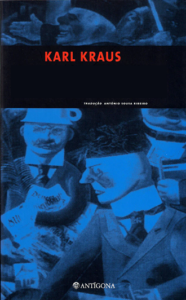 not become involved in the mid-20th century in the ideological and nationalist appeals that Europe was making amid the weakening of the Austro-Hungarian Empire and the growth of militaristic sentiments that led to war, Karl Kraus, a playwright and writer Austrian (they were born in 1874 in a village in Bohemia (today the Czech Republic), then part of the Austro-Hungarian Empire.
not become involved in the mid-20th century in the ideological and nationalist appeals that Europe was making amid the weakening of the Austro-Hungarian Empire and the growth of militaristic sentiments that led to war, Karl Kraus, a playwright and writer Austrian (they were born in 1874 in a village in Bohemia (today the Czech Republic), then part of the Austro-Hungarian Empire.
Unlike the journalism of his time that he criticized, those that judged seers like Raphael Schermann who was in evidence in Vienna and who criticized him, Karl Kraus’ criticism was directed at the political-ideological engagement of the journalists of his time, which he criticized since the vulgar language that they used even the moral decadence of their time that they mirrored.
Famous and known today for his book “Aforismos” (Arquipélago Editorial, 2010), which he defined as “Aphorism never coincides with the truth; it’s either a half truth or a truth and a half”, he had several works published recently in Portuguese, there were the releases in Portuguese of the works “The last days of humanity” by the Portuguese publisher Relógio d´água and more recently of texts from his newspaper “ Die Fackel” (The Torch or The Archote, as the Portuguese prefer) which were written during the First World War, which was one of the most prominent opponents.
There was an incomplete edition of The Last Days of Humanity, edited by Antígona in 2003, by its Portuguese translator Antônio Souza Ribeiro, recalls the young man who arrived in Vienna and had already written “Literature in Demolition” in 1897 and “A Crown for Zion” in 1898, as “In fact, what will be the distinctive mark of Kraus’s position in the Viennese literary field, defined by Edward Timms as a “combative isolation” is clearly outlined here” (pg. 96).
While the “media” of his time engage in ideological discourses of his time, his translator writes “… on the contrary, Kraus is laying, in a pioneering way, the foundations of what could today be called a critique of the media, in which constitutes one of the most strikingly topical dimensions of his work” (pg. 97).
Although lonely, Karl Kraus did not close himself off: “The reality is that, throughout his life, while facing irreducible hatred within the Austrian and German literary field, Kraus cultivated a very wide circle of relationships, which intersects with relevant intellectual and artistic circles and with several prominent names from the first decades of the century…” (pg. 97).
With the outbreak of war in August 1914, only one issue of the Magazine “Die Fakel” would appear in December 1914 with the 20-page text “In this great era”.
After publishing a new short text in February 1915, the magazine “…republished itself, in October 1915, with an extensive number of 168 pages, to establish itself as a space of violent rejection of the war policy in all its aspects” (p. 101).
In addition to his importance for the history of journalism, Karl Kraus brings great reflection to the present day.
RIBEIRO, Antônio Sousa. (2003) Os últimos dias da humanidade (The last days of humanity – reading manual), Portugal, Porto: Ed. Teatro Nacional de São João (Manual de Leitura Últimos Dias final.pdf (tnsj.pt)).

